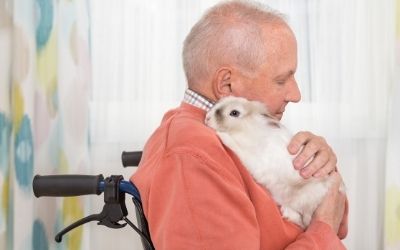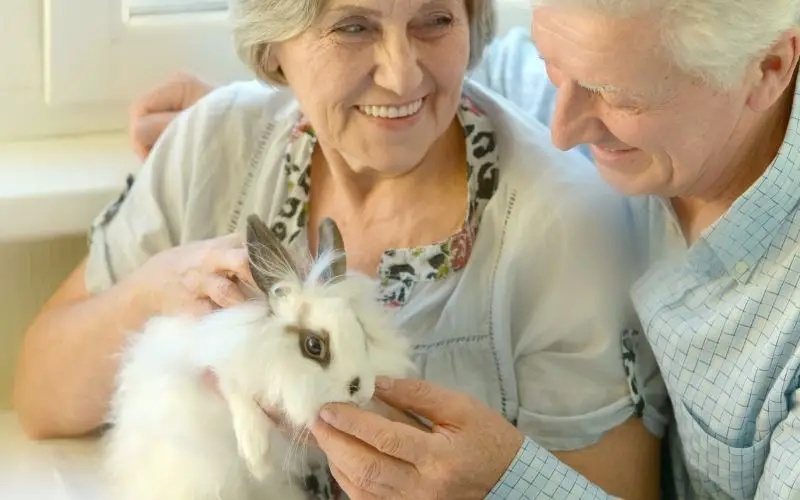As senior citizens get older, they need a companion that can make them happy and bring joy to their life. Bringing home a pet rabbit may be a great way to do this!
In this article, we’ll take a look at whether there are any advantages or disadvantages of such an idea and whether senior citizens really should consider getting a rabbit as their pet.
Is it OK for senior citizens to have rabbits as pets?
In many cases, it’s often highly recommended rabbits are great pets for senior citizens. Rabbits are gentle and unassuming animals that require a moderate amount of care and a lot of love. They are also small which makes them easy to manage for most seniors. They don’t normally require special diets, just the usual hay, vegetables, and pellet food. In most cases, the leafy greens we consume may also be eaten raw by your rabbit as well.
Now, we understand that there are some limitations in what senior citizens can do. A lot of it can be due to age and capacity. In this article, we are referring to senior citizens who are independent and don’t require daily help themselves.
If a senior citizen has difficulty with regular daily tasks like washing dishes, folding clothes, memory loss, then owning a rabbit may not be a good idea.
But let’s dig further into this.
Jump to...
What are some of the advantages of seniors owning rabbits?
The advantages of getting a senior citizen a pet rabbit include physical exercise, low maintenance, and the chance to experience the companionship of another living creature. Here is a list of some of the reasons in detail:
Rabbits bond to their owners

Rabbits are great for therapy. Seniors looking for companionship can find exactly that in rabbits. Rabbits will follow their owners, allow owners to pick them up, and even want owners to pet them. It’s similar in this sense to owning a cat or dog. People with depression or anxiety tend to be more at ease when they own a pet.
Rabbits can make your senior citizen feel better and less lonely. Not only will they feel better emotionally, but it can help improve the senior’s mental state as well.
Another great thing about rabbits is that they are typically very affectionate animals. They are playful and curious and enjoy human company.
Rabbits require playtime
Now, I put playtime in the advantages because of a number of reasons. Yes, it can be both good and bad so I’ll discuss more of the disadvantages of this later on.
However, the benefit of rabbits requiring playtime is that it will help the senior to play a more active role in taking care of his or her rabbit. This may also benefit the senior more directly giving him a chance to exercise while moving around.
The American Heart Association provided created a study that details how seniors who own pets had a reduced risk of cardiovascular disease. They ultimately concluded that this was most likely due to how active the owners had to be to keep up with their pets.
Rabbits are social animals and they require the occasional interaction with others. Rabbits often require on average 1 to 3 hours outside of their cage. This doesn’t have to be every day so there’s not likely a situation where the seniors have to over-extend themselves.
Rabbits are small and may be easier to manage for senior citizens
Senior citizens may find it difficult to take care of large pets such as a dog or a cat. A rabbit may be more manageable for them. Most pet rabbits weigh only about 5 pounds, while some are even smaller. This makes them easy to pick up and carry around. It really depends on what breed you pick and that’s why we recommend you read our Top 11 Friendliest Rabbits You’ll Want as Pets: Perfect for Adults and Children.
Rabbit maintenance can be somewhere in between dogs and cats.
A rabbit will not require long walks (or if you must, they should be short ones). They are normally confined to the house and yard. Your senior citizen friend will not have to worry about your rabbit doing damage to the home nor will he or she have to spend a lot of time training the animal. They are very intelligent creatures and so training is not difficult.
Rabbits are quiet
While rabbits are known to scream, they don’t do this often. They are relatively quiet animals and if you do hear any sound from them, it’s most likely due to fear or a situation that your rabbit doesn’t want to be in.
More often than not, rabbits stay quiet throughout the night and this will help senior citizens get the rest they need.
Rabbits can be litter box trained like a cat
The first thing you’ll want to do is make sure your rabbit is litter trained. And this is quite easy since rabbits are usually very intelligent creatures.
There’s no need to consistently walk your rabbit outside like you would if you owned a dog. This is great for seniors who have difficulty with moving around.
Regular maintenance of rabbits isn’t so bad
I know I mentioned that this article is focused on senior citizens who are still mobile and independent, but I wanted to add that if they had a caregiver, and that caregiver was willing to help with the rabbit, this may benefit the senior. Rabbits are fairly easy to take care of. All they need is a batch of hay, a bowl of rabbit pellet food, and a daily changing of freshwater.
They will also need to occasionally scoop out litter from the litter box about every other day. It’s really not too bad when you think about it.
What are some of the disadvantages of seniors owning rabbits?
While there may be a lot of reasons for seniors to own rabbits, I want to discuss some of the few reasons why this might not always be a good idea. Or at least understand what you need to consider before venturing out and bringing one home.
Rabbits need social interaction to stay healthy
Like humans, rabbits require social interaction. If left alone, for long periods of time, this may harm your rabbit’s health. Even though domesticated rabbits can spend the majority of their lives indoors, letting them out of their cage regularly is something that must be done.
Rabbits need plenty of physical space for playtime
Rabbit cages and living areas don’t need to be big. However, when bringing rabbits out for playtime, it’s recommended to let them out in a large open area. A typical size living room set is good. The backyard is great. The idea here is to allow your rabbit to roam, discover and quench its curiosity.
This may be a challenge if seniors live in small living spaces or don’t have backyards.
Rabbits require some type of daily care
This may be the most difficult out of the list. It’s not that rabbits are needy or being that they require your undivided attention all day.
It’s the fact that in order to keep a rabbit living long and healthy, they need a few daily maintenances. It’s nothing too strenuous.
For example, rabbits require clean cages. Rabbits are actually very clean animals. So making sure their litter boxes are cleaned out when there’s a mess in there is important. If not, they will decide to use the restroom elsewhere.
Subtle cleaning of the cages, wiping down dirty spots, and changing out the bedding every 2 to 4 weeks depending on the smell and how it looks. This may not be a daunting task but it is a vital task in caring for your rabbit.
Rabbits need fresh food and water
A rabbit’s diet consists of hay, food pellets, vegetables, and water. These things need to be replaced when they get dirty.
Hay lasts for a long time so that’s ok to leave for 2 to 3 days. Hay is perhaps one of the most important components of a rabbit’s diet. Don’t forget.
The food pellets are there for supplementary reasons that can be given to rabbits in small quantities. However, it’s not necessary every day. They contain a wide array of nutritional substances and are partially made of hay as well.
Water is also important. Make sure to change out the water each and every day or when the water starts to look dirty.
Leafy greens and other vegetables are welcome as well. Give about 1 cup of fresh veggies to smaller rabbits (less than 5 pounds) and about 2 cups to larger ones (over 5 pounds) daily.
Conclusion: Rabbits are great for senior citizens, but they do require some maintenance
Rabbits are beneficial in many ways, but there are some disadvantages to owning rabbits as pets. One of the most important disadvantages to owning a rabbit is that it requires some amount of maintenance. Rabbits require a proper diet and clean cages along with their food and water needs. That being said, owning a rabbit can be fun for seniors who have the time to take care of one.
I wouldn’t hesitate to think that rabbits can definitely improve the quality of life of seniors who need it. Providing companionship is an important part of being alive and living well. Rabbits can fill that void.
If you’ve already made the decision to go out and own a rabbit for yourself or your senior friend/family, good for you! It’s a blessing.
We also have a list of essential products here that we recommend to get you started.
Other interesting articles:
